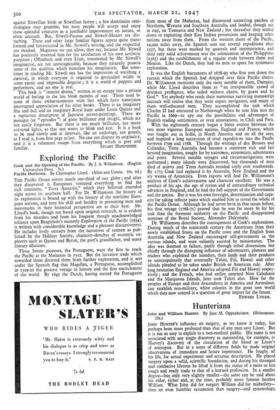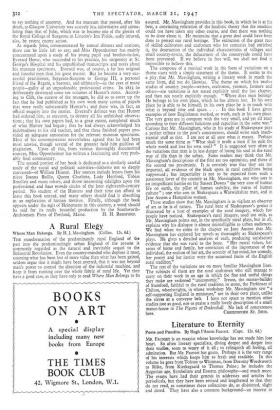Hunteriana
John and William Hunter. By Jane M. Oppenheimer. (Heinemann. 25s.) Joins HuNTER's influence on surgery, as we know it today, has perhaps been more profound than that of any man save Lister. But it is not so easy to explain to a non-medical public. His name is not associated with any single discovery as outstanding, for example, as Harvey's discovery of the circulation of the blood or Lister's of antisepsis. But in a score of different fields he made original observations of immediate and future importance. He fought. all his life, for actual experiment and accurate description. He placed surgery upon a solid, scientific foundation, and during his thronged and combative lifetime he lifted it from the status of a more or less rough and ready trade to that of a learned profession. In a smaller degree—but only very slightly smaller—the same can be said about his elder, richer and, at the time, probably more famous brother William. What John did for surgery William did for midwifery— then an even humbler occupation than surgery—and gynaecology, to say nothing of anatomy. And the museum that passed, after his death, to Glasgow University was scarcely less informative and stimu- lating than that of John, which was to become one of the glories of the Royal College of Surgeons in Lincoln's Inn Fields, sadly injured, alas, by recent enemy action.
As regards John, conunemorated by annual dinners and orations, there can be little left to say; and Miss Oppenheimer has mainly concentrated upon a study of his young pupil and brother-in-law, Everard Home, who succeeded to his practice, his surgeoncy at St. George's Hospital and his unpublished manuscripts and notes about his museum specimens. Everard was, of course, a far less original and forceful man than his great master. But he became a very suc- cessful practitioner, Sergeant-Surgeon to George III, a personal friend of the Regent, a baronet, and ultimately—in the eyes of many people—guilty of an unpardonable professional crime. In 1823 he deliberately destroyed some ten volumes of Hunter's notes. Accord- ing to Clift, the curator of the museum, he did so to cover up the fact that he had published as his own work many scores of papers that were really substantially Hunter's ; and there was, in fact, an official enquiry into the matter. Everard's defence was that Hunter had ordered him, as executor, to destroy all his unfinished observa- tions ; that his own papers had, to a great extent, completed much of what Hunter had begun ; that he had always acknowledged his indebtedness to his old teacher, and that these finished papers pro- vided an adequate annotation for the relevant museum specimens. Most of his contemporaries nevertheless agreed that he had been most unwise, though several of the greatest held hint guiltless of plagiarism. Upon all this, from various thoroughly documented sources, Miss Oppenheimer has written a fascinating and very prob- ably final commentary.
The second portion of her book is dedicated to a similarly careful study of the social and political activities—hitherto not so deeply canvassed—of William Hunter. Her sources include letters from his niece Joanna Baillie, Queen Charlotte, Lady Hertford, Tobias Smollett and many others, and throw interesting sidelights upon the professional and haut monde circles of the later eighteenth-century period. No student of the Hunters and their time can afford to leave this book unread, and many others should find it absorbing as an exploration of human motives. Finally, although the book appears under the mgis of Heinemann in this country, a word should be said for its really beautiful production by the Southworth- Anthoensen Press of Portland, Maine. H. H. BASHFORD.



































 Previous page
Previous page